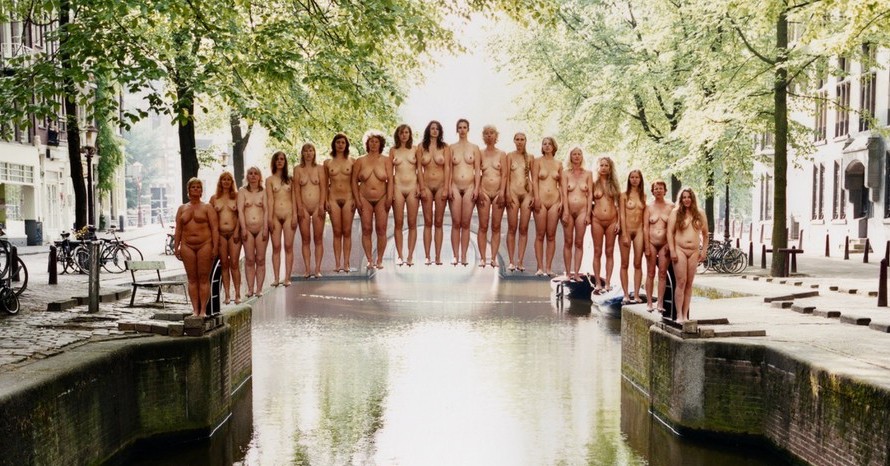About 100 people stripped naked in front of Facebook’s New York offices as part of a censorship protest against Facebook and Instagram’s policies surrounding artistic nudity. The artist Spencer Tunick led the protest via his extensive social media network.
Facebook and Instagram, while permitting nudity in sculpture and painting, ban photographic representations of the nude body
Demonstrators sprawled naked on the road, each holding a large image of male nipples covering their genitalia. The protest — called #wethenipple — was organized and photographed by internationally-renowned American artist Spencer Tunick and the National Coalition Against Censorship (NCAC).
Members of women’s rights group Grab Them By The Ballot took part in the demonstration. The group said in a statement it was “challenging the censorship of artistic female nudity by Facebook and Instagram’s ‘community standards.'”
A letter from the National Coalition Against Censorship states; “Instagram and Facebook have dramatically increased artists’ ability to reach audiences and have opened new possibilities for artistic exploration and expression. Artists who lack access to traditional distribution channels can reach global viewers as never before. Museums and art institutions are able to broaden access to their collections and promote exhibitions on an unprecedented scale.
Yet Facebook and Instagram, while permitting nudity in sculpture and painting, ban photographic representations of the nude body. The nudity ban is punishing for photographers and particularly harms artists whose work focuses on their own bodies, including queer and gender-nonconforming artists. It also affects museums and galleries that have difficulty promoting photography exhibitions featuring nudes.
Facebook has the legal right to impose content restrictions. Yet, as a company with over two billion users, and one billion on Instagram, Facebook’s actions impact culture on a global scale. The company’s extraordinary expansion and success has made it a worldwide power serving a large diversity of communities with different, and often conflicting, values and beliefs.
We acknowledge that moderating content for billions of users with diverse values presents unprecedented challenges and that drawing the line between art and images that are not art is notoriously hard. But this challenge does not justify banning all photographic images of the nude body, a ban that imposes the beliefs of some Facebook users on the entire world, stifles artistic expression, and enforces gender discrimination by permitting images of male nipples while prohibiting female nipples.
Over twenty U.S. and international arts and free speech organizations and hundreds of artists have joined us in urging Facebook and Instagram to become welcoming platforms for the arts (ncac.org/we-the-nipple). There are many possible solutions to the challenges of serving diverse communities, including allowing individuals the ability to block all nudity and creating filters to screen nudes that may appear unexpectedly in users’ feeds. Such mechanisms would allow user control, rather than forcing Facebook to judge what content is permissible.
As a commitment to changing its policy on photographic nudity, we propose that Facebook convene a group of globally representative stakeholders including artists, art educators, museum curators, activists, as well as Facebook employees, to develop guidelines that transparently balance the competing interests of the many different communities Facebook serves.
By engaging with relevant stakeholders who share a commitment to change, Facebook and Instagram can implement a policy that recognizes the value of one of their core communities: creative artists. – National Coalition Against Censorship.
Netherlands 13 (Dream Amsterdam Foundation) 2007 All images copyright Spencer Tunick/Naked Pavement Inc.

